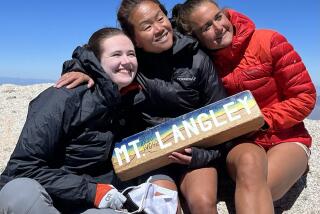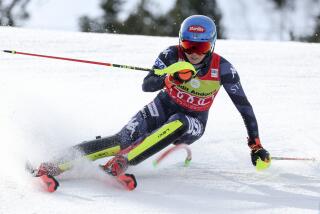For McKinney, Gold Medal Is Precious : It’s a Career First for U.S. Skier, Who Wins Women’s Combined
- Share via
VAIL, Colo. — The day Tamara McKinney has been skiing for all her life finally arrived Thursday.
Not quite a year after her tearful departure from the Winter Olympics at Calgary, with her racing and personal lives in disarray, McKinney climbed back atop the world.
The 5-foot 3-inch, 128-pound McKinney conquered the seemingly invincible Swiss, Vreni Schneider, and won the first gold medal of her life in the women’s combined event of the World Alpine Ski Championships before a wildly cheering home crowd on Vail Mountain.
As her name lit up the top line of the scoreboard, it was as if a cloud suddenly lifted from above McKinney’s head. She flashed a winning smile, thrust a fist into the air and fell into the arms of the onrushing Schneider, who was the first to greet her at the finish line.
In February, 1988, after falling in the first runs of the Olympic slalom and giant slalom, McKinney said: “I don’t know if it has left any void in my life, because I don’t know what it feels like to win a (gold) medal. . . . I have other things in my life. There are people I love and want to be with.”
In February, 1989, with a gold medal all but around her neck, McKinney said: “Yahoo!”
At Calgary, McKinney was not sure she would ever race again, and her only thought was to be with her dying mother at Tamara’s home in Squaw Valley.
Frances McKinney, who brought her seven children west to the Sierra from Kentucky so they could ski, died of cancer last spring at 62. About a month later, Tamara’s younger half-brother, McClain, her buddy in running slalom gates on Squaw Valley’s coin-operated course, committed suicide.
“Everybody has hard times, and the people I loved and who loved me helped me through them,” McKinney said Thursday. “Last year was a difficult one. My leg injury (in November, 1987) didn’t help, but it wasn’t serious--just bad timing. I decided last summer that I wanted to begin training again. I wanted to concentrate on something I was really interested in. By the end of summer, I was confident I could come back.”
This winter, McKinney, 26, quickly proved that she had indeed come back, taking a second and two third places in World Cup races. She ranks third in the slalom standings with 50 points, behind Schneider and Austrian Monika Maierhofer, and is one of the medal favorites in the regular women’s slalom Monday at Beaver Creek.
McKinney has raced downhill just a few times on the international level, as has Schneider, 24, whom McKinney trailed by only .12 of a second after the combined slalom Sunday. In downhill training runs earlier this week, Schneider admitted, “I was cautious and didn’t take any chances.”
One of the Swiss coaches said that subconsciously, Schneider might have been too careful, trying to avoid an injury that might knock her out of next week’s races. She has won all five slaloms and all five giant slaloms held so far this season on the World Cup women’s circuit, and the combined is secondary to her.
“I was more aggressive today,” Schneider said after Thursday’s downhill portion of the combined. “But I knew that Tamara had been cruising pretty well in training and that if she had no problems, she would win. I expected it, and I am happy for her--and with my silver medal.”
Schneider, starting No. 8, briefly held the lead in the combined standings with her time of 1 minute 33.94 seconds, and it stood up until McKinney, the No. 16 racer, came through with what she called “by far the best downhill run of my life.”
McKinney’s time of 1:32.10 was the third-fastest of the day, behind the 1:31.70 of Canada’s Kerrin Lee and the 1:31.99 of Switzerland’s Brigitte Oertli, but it was enough to give her first place in the combined with a winning low total of 5.65 points. Schneider, whose downhill time wound up being 11th fastest, was well back in second place with 26.63 points, followed by her teammate Oertli, who took the combined bronze with 32.88 points.
McKinney, who was clocked at nearly 68 m.p.h. through one stretch of the nearly 1 1/2-mile course, said that watching videos of her training runs helped her win the gold medal.
“I could see that there was plenty of room for improvement, for more attacking,” she said. “I scared myself on one (training) run, when I nearly went into the nets, and I decided I just had to be stronger. So I really pushed myself.”
In the race itself, McKinney said, “I went too wide at one turn near the top, and this made me more aggressive through the bottom of the course.
“This was just my day. Somebody was helping me today.”
McKinney, whose best Olympic finish was a fourth place in the giant slalom at Sarajevo, Yugoslavia, in 1984, took the combined bronze medals in the 1985 World Championships at Bormio, Italy, and the 1987 World Championships at Crans-Montana, Switzerland.
After her disaster at Calgary, the rap against McKinney was that she couldn’t win a gold medal.
“I’ve had good races and some not so good,” said McKinney, who was the 1983 World Cup women’s overall champion. “But it’s silly to use statistics and say that someone is incapable of being a gold medalist.”
Asked if the gold medal was more important to her than the ’83 World Cup trophy, McKinney said: “Do I have to choose? That was a great year, but it was a long time ago. It’s nice now to be able to come back and ski so well, especially here in Colorado, where everybody is rooting for us.”
Paul Major, the U.S. ski team’s women’s coach, said that McKinney would take today off to watch the men’s combined downhill--although the race may be pushed back after high winds again forced cancellation of both training runs Thursday at Beaver Creek.
“Then she’ll put away her long (downhill) skis and get into her slalom skis to go after Schneider again,” Major said.
McKinney, asked what she planned to do Thursday night, said: “I’ll probably get together with the team and pop a, uh, mineral water or two.
“Right now, I’m still trying to figure out what I did. And don’t ask me about whether I’ll race again next year. I’m just beginning to think about today and tomorrow.”
In other words, her gold medal hasn’t sunk in yet?
Said McKinney, who was slow in getting through doping control after the race: “Nothing is sinking in except that gallon of water I just drank.”
More to Read
Go beyond the scoreboard
Get the latest on L.A.'s teams in the daily Sports Report newsletter.
You may occasionally receive promotional content from the Los Angeles Times.






